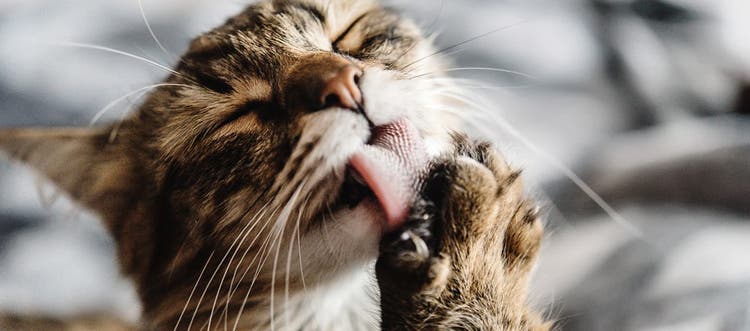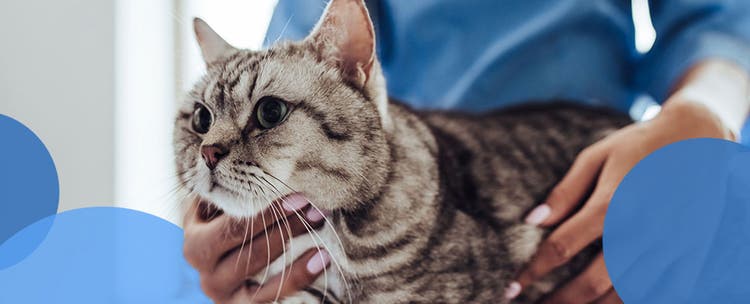What to know about roundworms and cats.
Roundworms are one of the most common types of worm found in domestic cats. Learn the answers to the most common questions about roundworms in cats to help keep your pet roundworm-free.
What Are Roundworms?
Roundworms are extremely common intestinal worms that live in an infected cat’s small intestine. Unlike many other intestinal worms, roundworms don’t attach to the wall of your cat’s intestine.
What Do Roundworms Look Like in Cats?
Roundworms are cylindrical and resemble pieces of cooked spaghetti: pale in appearance — white or light brown — with smooth, non-segmented bodies. Growing up to several inches long, they can be seen by the naked eye. If your cat has roundworms, you may notice worms in their feces or vomit.
How Do Cats Get Roundworms?
Cats can pick up roundworms in three different ways:
- Roundworm eggs are passed in the poop of infected cats and other wildlife and can lay dormant in soil, sand pits and litter boxes. These eggs can then spread to other cats if ingested while sniffing around in infected soil, plants or stool.
- Roundworms can be picked up when cats catch and eat infected rodents, insects or birds.
- Kittens can become infected with roundworm from their mother’s milk, which is why young kittens often have worms even when they’ve never been outside.
How Do I Know If My Cat Has Roundworms?
An adult cat with roundworms will often show no symptoms. However, make sure to occasionally check your cat’s poop for roundworms — a clear sign they have an infestation.
Kittens are more at risk for roundworms and may show a variety of symptoms including:
- Vomiting
- Coughing
- Potbelly appearance
- Diarrhea
- Slow growth
- Dull fur
These symptoms can be life-threatening in kittens. However, deaths from roundworm infestations are extremely rare in adult cats.
How Can I Get Rid of Roundworms in My Cat?
If your cat has roundworms, a variety of treatments are available, including worming tablets and spot-on formulas.
Are Roundworms in Cats Contagious to Humans?
Though very rare, roundworms can cause a disease in people called toxocariasis. Though humans cannot get roundworms from cats directly, people can accidentally ingest roundworm eggs — for example, if they touch contaminated soil or feces and do not wash their hands thoroughly afterward. If roundworm eggs are ingested, the larvae of the parasite can migrate into our tissues. In some cases the roundworm larvae end up in the infected person’s eyes, causing a condition called ocular larva migrans, which can lead to blindness.
How Can I Help Reduce the Risk of Roundworm in Cats?
Good hygiene practices can help reduce the risks of this parasite for both pets and people:
- Pick up your cat’s feces from the backyard (especially if young children in your household often play outside as well), and regularly clean your cat’s litter box.
- Wash your hands after cleaning out litter boxes.
- Wash your cat’s bedding regularly, along with any blankets or cushions your cat uses for sleeping or grooming.
- Control rodent and insect populations that could carry roundworm.
Implementing these good hygiene practices can help keep your pet happy and healthy for years to come.

Profender® (emodepside /praziquantel) for Cats
Profender® is a single-dose topical solution for the treatment and control of hookworm, roundworm and tapeworm infections in cats and kittens. Available with a veterinarian's prescription.

Advantage Multi® for Cats (imidacloprid + moxidectin)
A monthly topical that prevents heartworm disease and treats fleas, roundworms, hookworms and ear mites. Available with a veterinarian's prescription.
Profender® Topical Solution (emodepside/praziquantel)
Indications:
PROFENDER Topical Solution is indicated for the treatment and control of hookworm infections caused by Ancylostoma (adults, immature adults, and fourth stage larvae), roundworm infections caused by Toxocara cati (adults and fourth stage larvae), and tapeworm infections caused by Dipylidium caninum (adults) and Taenia taeniaeformis (adults) in cats that are at least 8 weeks of age and weigh at least 2.2 lbs.
Important Safety Information:
CAUTION: Federal (U.S.A.) law restricts Profender® to use by or on the order of a licensed veterinarian. HUMAN WARNING: Children should not contact application site for twenty-four (24) hours while the product is being absorbed. PRECAUTIONS: The effectiveness of this product when used before bathing has not been evaluated. Use with caution in sick or debilitated cats. Oral ingestion or exposure should be avoided.
Advantage Multi® for Cats (imidacloprid + moxidectin)
Indications:
Advantage Multi® for Cats is a once-a-month topical solution for the prevention of heartworm disease, killing adult fleas, the treatment of flea infestations, the treatment and control of ear mite infestations and hookworm, and roundworm infections in cats and kittens 9 weeks of age and older.
Important Safety Information:
CAUTION: Federal law restricts Advantage Multi® for cats to use by or on the order of a licensed veterinarian. WARNINGS: Do not use on sick or debilitated cats or ferrets. Do not use on underweight cats (see ADVERSE REACTIONS). Do not use on cats less than 9 weeks of age or less than 2 lbs. body weight. Do not use on ferrets less than 2 lbs. body weight. PRECAUTIONS: Avoid oral ingestion. HUMAN WARNINGS: Children should not come in contact with the application site for 30 minutes after application.





